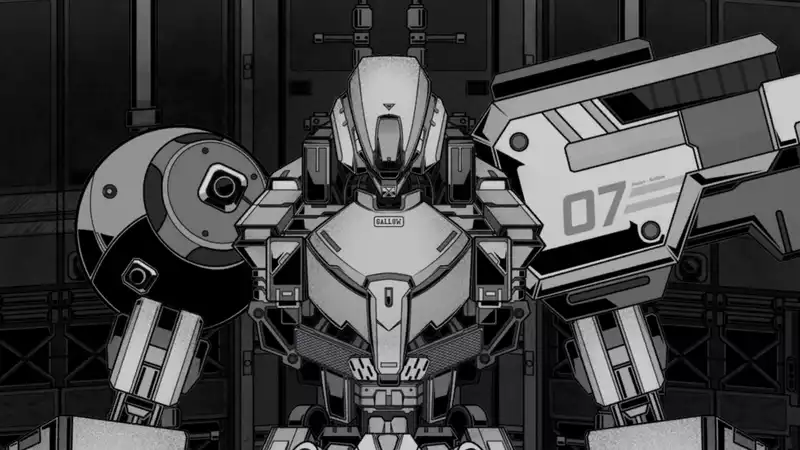A dog, a gang and a witch in a bar. You may think you've heard this story somewhere before, but you haven't. Wolf Stride" by Otaimon is a game unlike any other. While it is a self-described RPG for adults, it indulges in a bit too much immature humor. Mech battles fall short, and "Wolfstride" doesn't fully live up to narrative expectations, but its carefully considered setting and unique cast of characters make it a breath of fresh air in a genre that tends to stagnate.
With an action-packed opening, one could be forgiven for thinking that "Wolf Stride" would be faster-paced. The first act opens with a mecha battle, in which the lovable screw-up pilot Knife Leopard (for some reason, "Pineapple") faces off against criminals in a hand-to-hand robot fight. Elsewhere, protagonist Dominic Shade tries to escape two yakuza (a cat and a dog) who try to convince Pineapple to throw the fight. Shade refuses, and the Pineapples' mech explodes at the sound of the yakuza's special dog toy.
This is all the action we see for a while. Shade, Pineapples, and the team's grumpy dog mechanic, Duque, settle into a routine of exploring Rain City, meeting new people, and throwing themselves desperately into any opportunity to make money. In the game, they have 63 days to repair their shattered mech, Cowboy, and prove themselves in the Ultimate Golden God Tournament. However, much of that time feels wasted as Wolfstride gradually unfolds the story.
Some days there is only one job, so they stagger down the empty highways of Rain City to the scrap yard, have a brief conversation, and then return to the hangar to turn in. Shade eventually gets a few part-time jobs, which serve as a way to interrupt the repetitive action as well as a way to make money. The goal is to pour that money into cowboys for arena fights, but rather than an action-packed RPG, Wolfstride is more of a slice-of-life visual novel about middle-aged, down-on-their-luck heroes.
The focus on older and, frankly, less likable characters is refreshing, and I remained far more interested in how Shade's story unfolded than in the mecha fights. However, "Wolfstride" doesn't know what to do with itself and leans too heavily on the "immature" part of its tagline, "an RPG for immature adults." For example, the character arc centered around a robot called "Peepoo." For example, an entire character arc centered around a robot called "Peepoo."
If you don't smile gleefully at the job of "the boy who delivers special messages," abbreviated as "BDSM," you'll probably skip over a good portion of Wolfstride's dialogue.
However, despite their penchant for cracking unfunny jokes, I've come to care about the strange people of Rain City. It is a jazzy, multicultural metropolis with a surprisingly unique sense of place. Early on in Wolfstride, the ruined streets feel much like another city, but as you unlock more areas, you gradually gain a better understanding of Shade's world and how he got to where he is.
For the first week or two, two huge junkyards, a mech hangar, and a hospital dominate the map, leaving no doubt that for better or worse, the mech fight is the soul of Rain City. The downtown area is full of frustrated dreams and abandoned stores, so the local watering hole, Midnight Rider, feels like a friendly oasis on the edge of life's bleak landscape. The owner, Joy, is on hand to fix you a drink. On the way to the hospital, a peaceful mountain vista unfolds behind an aviary. It serves little purpose other than to remind us of what the area looked like before crime and robot wars took root.
It is the environmental storytelling that makes the flat, static characters interesting. There are few other cast members to compare them to, the closest being the yakuza: however, the characters in Wolfstride are more relatable than the most and their ilk. We feel conflicted when Joy talks about life's hardships and the need to bring in money, because we see it every time we travel anywhere in Rain City.
Combining this nuanced approach with Wolfstride's childish humor feels like a waste of potential.
Also, I would have liked to have seen more of the mecha battles themselves. While not as detailed as the mecha battles in Super Robot Wars or Trails of Ruthless Steel, there is a solid combat system waiting for us back in the cockpit. In Wolf Stride, the give-and-take dance continues, balancing between brute force and carefully planned defenses. You advance on the movement grid to claim your power bonus, but as a result, you get into range of the enemy's long-range attacks. The enemy pushes you back, but this time he is close enough that you can counterattack with a powerful melee attack. And you continue until one of you destroys the other's chest core.
The only downside is that you will see most of what Wolfstride has to offer early on. With few skill sets and a small battlefield, there is little room for experimentation or strategy, which is unfortunate. Wolfstride's combat is about as fresh as an RPG's casting, and I hope that Otaimon will be given the chance to create a more expansive system in the future.
For all its flashy and glaring flaws, Wolfstride succeeds in winning people over with its flawed hero and its confidence in its own story. Splitting the story's focus between off-kilter humor and an interesting tale of regret and redemption was not the best choice, but this scattershot approach does not stop it from being an unforgettable story.
.

Comments